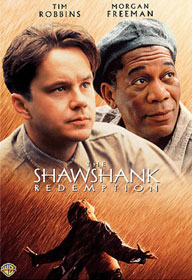 “I guess it comes down to a simple choice, really. Get busy livin’ or get busy dyin’.” ~~Red
“I guess it comes down to a simple choice, really. Get busy livin’ or get busy dyin’.” ~~Red
Friends and acquaintances periodically ask how I can spend so many waking hours staring at movies on screens large and small. They want to know why I love films so much. When I have trouble forming an answer in words, I direct them to “The Shawshank Redemption.” Frank Darabont’s film says more — and speaks more poignantly — than I ever could on the subject. Put simply, “The Shawshank Redemption” is a motion picture that shows the unique ability of the cinema to transport us into worlds a far cry from our own and show us how we all feel the same pain, fear, determination, rage, hope. “The Shawshank Redemption” speaks to the fragility and the resiliency of the human spirit and its capacity to stockpile hope. This is why people see movies.
So much of the film’s power lies in the screenplay, deftly adapted by Darabont from Stephen King’s moving novella “Rita Hayworth and the Shawshank Redemption,” and Roger Deakins’ cinematography, which evokes a very real and chilling desperation that seems to seep into our bones. Darabont takes great pains to preserve the unsentimental but hopeful spirit of King’s story, set in Shawshank Prison in Maine, but he takes some liberties with the plainspoken narrator, Otis “Red” Redding (Morgan Freeman). King originally wrote Red as a 50-ish Irishman, but here Darabont relies on Freeman. Nothing is lost and so much is gained in this translation, for Freeman is an actor who radiates quiet dignity. His Red, “the guy who gets things,” is a cautious observer of prison life more than a participant, and after 30 years he’s done anticipating his release. “One day, when I have a long gray beard and two or three marbles rollin’ around upstairs, they’ll let me out,” he reasons. Red also doesn’t think much of newcomer Andy Dufresne (Tim Robbins), convicted of killing his wife and her lover; in fact, he refers to Andy as “that tall drink of water with the silver spoon up his ass.” Only Freeman could take that line and make it as astute as it is funny.
Red, as it turns out, and his cronies — Heywood (William Sadler), Floyd (Brian Libby) and Brooks (James Whitmore), a near-lifer dreading his approaching parole date — figured Andy all wrong. He’s tougher than he looks and he pulls some legendary stunts, like convincing Warden Norton (Bob Gunton), a cruel Bible thumper, to let him drastically expand the prison library, then locking himself in the warden’s office and blasting “The Marriage of Figaro” over the prison speakers. Andy also forges a tentative friendship with Red, and their bond changes the shape of their lives: Red can’t pretend he’s still content marking time, and Andy can’t keep choking back the rage the rage his wrongful conviction and the warden’s shady dealings have left him with.
Bringing life to written words (specifically those written by Stephen King) necessitates a strong team of actors, and “The Shawshank Redemption” is not light on talent. Gunton hints at the insecurity behind Warden Norton’s tyrannical behavior, and Clancy Brown is fearsome as Captain Hadley, who delights in brutality and abuse. Darabont hand-picked Freeman for Red, claiming he was the best choice, and he’s right. Red requires a specific elegance, a mix of sardonic wisdom and world-weary humor that Freeman projects without effort. Though Robbins wasn’t the original pick for Andy, it’s impossible to imagine a better one. His role, too, is a delicate balance of simmering emotion, calm and cunning. Freeman deservedly received an Oscar nomination, but Robbins’ performance is the one that sneaks up on us, reminding us that dreams exist even when they’re forced into tiny, cold, walled-up cells.
There’s a moment, in fact, where we can see all this plain on Andy’s face. When he emerges from the hole, he tells Red of his dreams, of living in Mexico where the Pacific has no memory. As he talks, we see he’s not dejected but hopeful. More than that, he’s alive. Inside him is a resolve that the warden and Captain Hadley just can’t break, and there’s something beautiful and immensely uplifting about that.
Filed under: Reviews, Top 100 Reviews | Tagged: Bob Gunton, Brian Libby, Clancy Brown, Frank Darabont, James Whitmore, Morgan Freeman, Stephen King, The Shawshank Redemption, Tim Robbins, William Sadler | 22 Comments »




